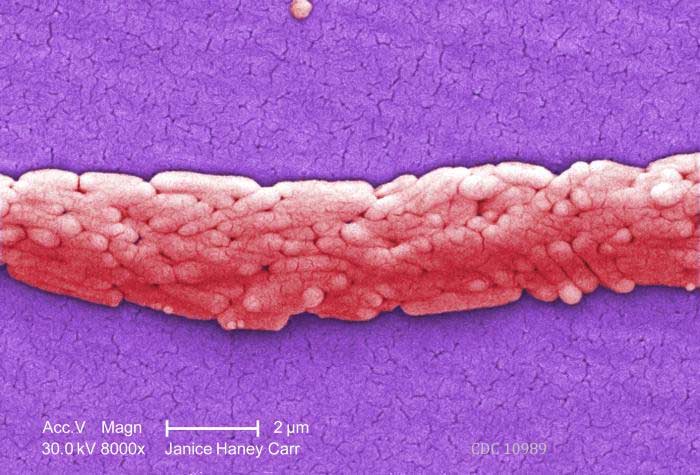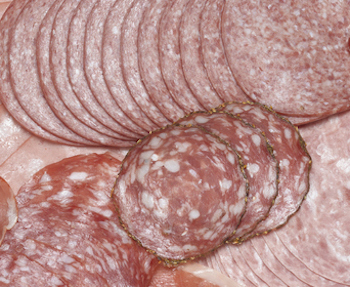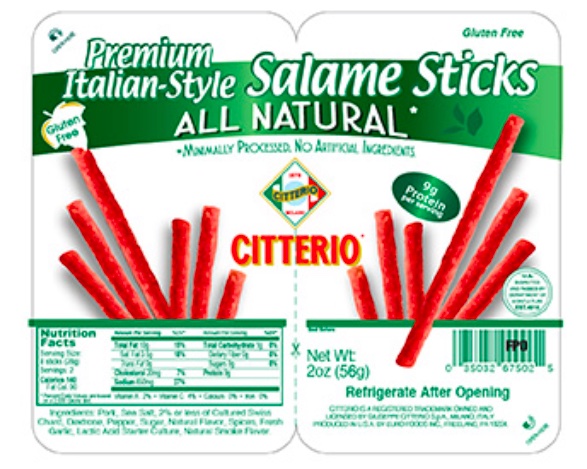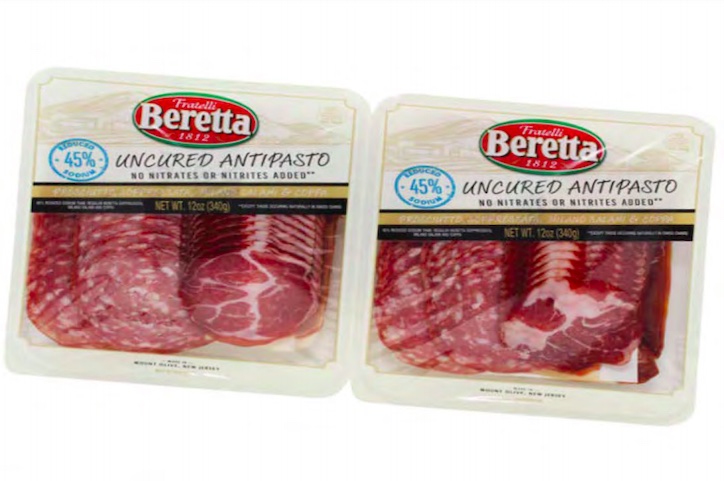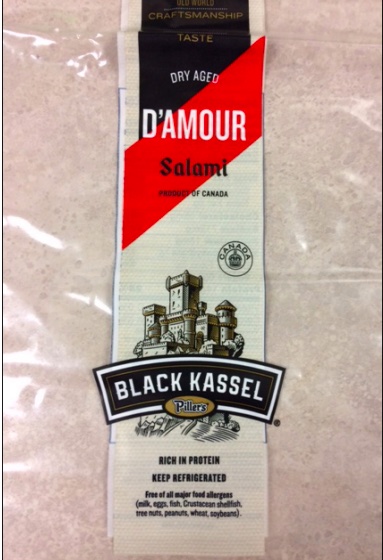Salami Recalls and Outbreaks
Salami recalls and outbreaks are fairly common. At least seven recalls have been issued for salami products contaminated with Salmonella, Listeria, and E.coli since 2010. And five multistate outbreaks have been linked to salami products during that same period.
Most salami recalls and outbreaks are due to Salmonella contamination. Pritzker Hageman food poisoning attorneys have investigated Salmonella outbreaks linked to salami and represented clients sickened in these outbreaks.
2023 Salami Recall
Salami and other Italian-style meats are part of a 26-ton Listeria recall by Daniele International of Mapleville, RI. The recall includes salami, soppressata, capocollo (capicola), and prosciutto sold under multiple brand names at Walmart, Sam’s Club, Meijer, Publix, Target, Whole Foods, and other stores.
2021 Citterio Salame Sticks Salmonella Outbreak
An ongoing Salmonella outbreak linked to Citterio Premium Italian-Style Salame Sticks has sickened 31 people in 10 states. Six people have been hospitalized. These products were sold at Trader Joe’s and Wegmans stores nationwide.
State and local public health officials have interviewed 15 of the outbreak patients about the foods they ate in the week before they got sick. All of them said they ate salami sticks, 14 named Citterio brand Premium Italian-Style Salame Sticks. Records show 13 people bought the implicated salami sticks at Trader Joes’s and one person bought them at Wegmans.
The people sickened in this outbreak, who range in age from two to 75 years old, reported the onset of symptoms on dates ranging September 18, 2021, to October 3, 2021.
The number of illnesses reported from each state is: California (8), Illinois (3), Kansas (1), Michigan (3), Minnesota (3), New Jersey (1), New York (1), and Virginia (1).
Citterio Salame Sticks Recall
On November 10, 2021, Euro Foods of Freeland, PA issued a salami stick recall. The recall includes 119,091 pounds of salami sticks produced prior to October 25, 202 that were sold nationwide and in Bermuda. The recalled salami products have the following information:
- Citterio “Premium Italian-Style Salame Sticks ALL NATURAL”
- Sold in 2-oz packages
- “Best by” dates through January 23, 2022, located next to the barcode.
- “EST. 4010” inside the USDA mark of inspection.
2021 Fratelli Beretta Antipasto Salmonella Outbreak
In August 2021, the Centers for Disease Control and Prevention (CDC), identified Fratelli Beretta antipasto trays as the source of a 17-state Salmonella outbreak that sickened 40 people before ending in October 2021. The trays, containing salami, prosciutto, soppressata, and coppa, were sold at Costco stores nationwide. Twelve people were hospitalized.
This outbreak included two Salmonella strains – Salmonella Typhimurium and Salmonella Infantis. Health officials interviewed 28 of the outbreak patients, 26 (93 percent) reported eating a variety of Italian-style meats. Of the 15 people who remembered the specific product they ate or had shopper card records showing a purchase, 14 had eaten Fratelli Beretta brand prepackaged Uncured Antipasto trays sold at Costco stores.
The people sickened in this outbreak, who range in age from 1 to 91 years old, said they first became ill on dates ranging from May 9, 2021, to August 16, 2021.
The number of illnesses reported from each state is as follows: Arizona (5), California (8), Colorado (1), Illinois (5), Indiana (1) Maryland (1), Michigan (2), Minnesota (2), Nevada (1), New York (1), Ohio (3), Oregon (2), Texas (3), Utah (1), Virginia (1), Washington (2) and Wisconsin (1).
Fratelli Beretta Antipasto, Salami Recall
On August 27, 2021, Fratelli Beretta issued a recall for the antipasto trays with “best by” dates of August 27, 2021, through February 11, 2022, and the UPC code 073541305316. These 24-oz. trays containing two 12-oz packages with slices of salami, prosciutto, soppressata, and coppa were sold nationwide at Costco.
The recall included 431 tons of product. But, in an outbreak update posted a few days after the recall, the CDC warned that the recall was not large enough and should have included all of the company’s antipasto products, not just one.
2020 Italian-Style Deli Meats Listeria Outbreak
On February 1, 2021 the CDC officially called an end to a four-state Listeria outbreak linked to deli meat that sickened 12 people and caused 1 death. The number of illnesses reported from each state was: Florida (1), Louisiana (1), Massachusetts (7), and New York (3). The patients ranged in age from 40 to 89 years old. They reported the onset of illness on dates ranging from August 6, 2020, to October 30, 2020. All of them were hospitalized. The fatality occurred in Florida.
Health officials interviewed 11 of the people about foods they had eaten before they became ill. All of them reported eating Italian-style deli meat, such as salami, mortadella, and prosciutto in the month before they became ill. No specific brand name was identified.
2018 Olli Salumeria Americana Salami Listeria Recall
In March 2018, Olli Salumeria Americana of Oceanside, CA issued a recall for Italian-style meats including salami, chorizo, soppressata, pepperoni m establishment for possible contamination with Listeria.
The recalled items, packaged on January 19, 2018, include:
- 6 oz. packages of Gusto NAPOLI APPLEWOOD-SMOKED SALAME, lot code 1000012821.
- 6 oz. packages of Gusto CHORIZO SMOKED PAPRIKA, lot code 1000012812.
- 6 oz. packages of Gusto SOPRESSATA BLACK PEPPERCORN SALAME, lot code 1000012811.
- 6 oz. packages of Gusto TOSCANO FENNEL POLLEN SALAME, lot code 1000012805.
- 6 oz. packages of Gusto PEPPERONI CLASSICALLY AMERICAN, lot code 1000012804.
- 175 gram packages of OLLI MOLISANA PEPPER + GARLIC SALAMI, lot code 1000012808.
- 175 gram packages of OLLI NAPOLI APPLEWOOD-SMOKED SALAMI, lot code 1000012810.
- 175 gram packages of OLLI CALABRESE SPICY SALAMI, lot code 1000012807.
The product labels have the establishment number M-45334 inside the USDA mark of inspection. The recalled meats were shipped to retail locations nationwide and exported to Canada.
The problem was discovered by the Canadian Food Inspection Agency (CFIA) through routine Listeria monocytogenes sampling. At the time of the recall, there were no reports of illness.
2017 Pillers Fine Foods Salami Salmonella Recall
In December 2017, Pillers Fine Foods of Waterloo, Canada issued a prosciutto and salami Salmonella recall for items produced from September 22, 2017 to October 12, 2017.
The recalled products, which were shipped to distribution centers in California, Illinois, Michigan, New Jersey and New York, include:
- Vacuum-sealed random weight plastic packages containing Black Kassel Pillers Dry Aged DAmour Salami with Best Before date of May 12, 2018
- Vacuum-sealed random weight plastic packages containing Black Kassel Pillers Dry Aged Speck Smoked Prosciutto with Best Before date of May 12, 2018.
FSIS discovered the problem through testing. At the time of the recall, there had been no reports of illness
2011 Seltzer’s Lebanon Bologna E. coli Outbreak, Recall
In March 2011, an E. coli O157:H7 outbreak linked to Lebanon bologna sold under the Seltzer’s brand name sickened 14 people. Lebanon bologna is similar in appearance to salami. The product linked to the outbreak was made by Palmyra Bologna Company, Inc. of Palmyra, PA.
The number of illnesses reported from each state was: Maryland (3), New Jersey (2), North Carolina (1), Ohio (2), and Pennsylvania (6). The people sickened reported onset of illness dates ranging from January 10, 2011, to February 15, 2011.
Lebanon Bologna E. coli Recall
In March 2011, Palmyra issued a recall for 23,000 pounds of Lebanon bologna products. The recalled products included:
- 6-ounce packages of “SELTZER’S BEEF LEBANON BOLOGNA” with lot code “01351” and best-by date of “Apr. 20 2011”
- 12-ounce packages of “SELTZER’S BEEF LEBANON BOLOGNA” with lot code “01351” and best-by dates of “Apr. 20 2011” or “Apr. 21 2011”
- 16-ounce packages of “SELTZER’S BEEF LEBANON BOLOGNA” with lot code “01351” and best-by date of “Apr. 22 2011”
- Whole chub packages of “SELTZER’S BEEF LEBANON BOLOGNA” with lot codes “01351” or “06337” and best-by date of “Feb. 14 2011,” “Feb. 15 2011,” “Feb. 16 2011,” or “Feb. 28 2011”
- Half chub packages of “SELTZER’S BEEF LEBANON BOLOGNA” with lot codes “01351” or “06337” and best-by date of “Apr. 6 2011,” “Apr. 7 2011,” “Apr. 16 2011,” or “Apr. 19 2011,”
- 12-pound bulk boxes of sliced “SELTZER’S BEEF LEBANON BOLOGNA” with lot code “01351” and best-by date of “Apr. 21 2011”
2010 Zemco Deli Meats Listeria Recall
In August 2010, Zemco Industries of Buffalo, NY issued a recall for deli meat products potentially contaminated with Listeria monocytogenes. The recalled meats included Black Forest ham, Virginia ham, roast beef, and salami.
- 25.5-pound cases of “Marketside Grab and Go Sandwiches BLACK FOREST HAM With Natural Juices Coated with Caramel Color” with the number 17800 1300.
- 28.49-pound cases of “Marketside Grab and Go Sandwiches HOT HAM, HARD SALAMI, PEPPERONI, SANDWICH PEPPERS” with the number 17803 1300.
- 32.67-pound cases of “Marketside Grab and Go Sandwiches VIRGINIA BRAND HAM With Natural Juices, MADE IN NEW YORK, FULLY COOKED BACON, SANDWICH PICKLES, SANDWICH PEPPERS” with the number 17804 1300.
- 25.5-pound cases of “Marketside Grab and Go Sandwiches ANGUS ROAST BEEF Coated with Caramel Color” with the number 17805 1300.
The problem was discovered through routine testing by the State of Georgia.
2010 Public Health Alert for Listeria in Siena Foods Salami
In March 2010, USDA FSIS issued a public health alert for deli meats that may have been contaminated with Listeria monocytogenes. The public health alert was issued after health officials in Canada tested the product during an investigation of a Listeria outbreak in that country. The health alert includes “Cacciatore Salami, Mild,” “Coppa,” “Prosciuttini,” “Prosciuttini Hot,” and “Prosciutto Cotto.”
2010 Daniele International Salami Salmonella Outbreak, Recall
In response to this outbreak, in January and February of 2010, Daniele International Inc. recalled over 1,400,000 pounds of ready-to-eat (RTE) varieties of salami/salame. These products were sold under the following brands: Daniele, Black Bear of the Black Forest, Dietz and Watson, Boar’s Head, and possibly others (see the product list on this page). The retailers who received the recalled salami include the following: Costco, Fred Meyer, Fry’s Food and Drug, Haggen, Hilander, Kroger, Market Basket, Quality Food Center – Fresh Fare, Ralphs – Ralphs Fresh Fair, Sams Clubs, Scotts, Smiths – Smiths Marketplace, Stop and Shop, Top Food, Waldbaums, Walmart, Weis.
According to the CDC, the salami Salmonella outbreak sickened at least 245 people in 44 states:
AK (2), AL (2), AZ (7), CA (30), CO (5), CT (5), DC (1), DE (3), FL (3), GA (3), IA (1), ID (4), IL (19), IN (4), KS (5), LA (1), MA (14), MD (1), ME (1), MI (4), MN (6), MO (2), MS (1), NC (11), ND (1), NE (3), NH (2), NJ (9), NM (2), NY (18), OH (9), OK (1), OR (9), PA (7), RI (2), SC (1), SD (3), TN (5), TX (7), UT (9), VA (1), WA (17), WI (1), WV (1), and WY (2).
The initial recall followed the isolation of Salmonella in a private laboratory from a retail sample of a salami product produced by Daniele International; this product was different than the sliced salami variety pack purchased at different grocery store locations by the 16 ill persons. FSIS reviewed and affirmed these private laboratory results.
The Salmonella strain initially found by the private laboratory was different from the strains causing the outbreak. However, the Washington State Department of Health subsequently tested the bacterial culture provided by the private laboratory (the salami was not provided) and identified two different Salmonella serotypes, the strain found by the private lab and Salmonella Montevideo indistinguishable from the outbreak strain.
In addition, the Iowa Department of Public Health and public health officials in Plymouth County, Iowa investigated a patient with Salmonella Montevideo infection indistinguishable from the outbreak strain and discovered an open sliced salami variety pack frozen at the patient’s home. The patient had eaten this product before becoming ill. This sliced salami variety pack was the same as that purchased by 16 other ill persons. Using DNA analysis, the University of Iowa Hygienic Laboratory (Iowa’s public health laboratory) confirmed that the Salmonella isolated from this leftover salami was indistinguishable from the outbreak strain of Salmonella Montevideo.
The recall was expanded as a result of a confirmed finding of Salmonella in an unopened salami product reported by the Illinois Department of Public Health. The product was sampled during the course of an ongoing investigation of a multistate outbreak of Salmonella serotype Montevideo illnesses. The product tested was not included in the previous recall issued January 23, 2010, but is similar to products bought by customers who later became sick and were identified as part of the Montevideo investigation. The company believes that black pepper is a possible source of contamination.
Recent test results provided by the Rhode Island Department of Health revealed that an opened container of black pepper used in the manufacturing of at least some of the recalled Daniele salami products was positive for Salmonella Montevideo and that the DNA fingerprint matched the outbreak strain.
